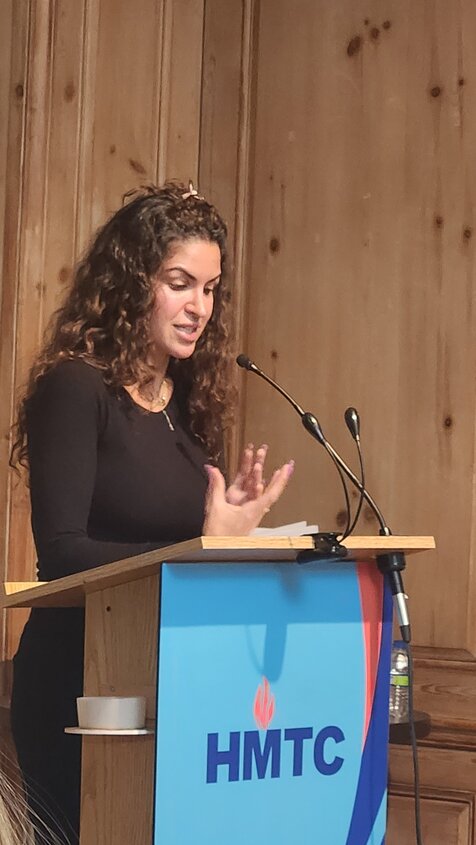Recalling horrors of the Holocaust and Oct. 7 attack
In recognition of International Holocaust Remembrance Day last Saturday, Gilda Zirinsky recalled for listeners at the Nassau County Holocaust Memorial and Tolerance Center how she survived as a child fleeing Nazi-occupied Belgium.
Zirinsky’s narrative unfolded with vivid detail, transporting her audience back to May 10, 1940, when the skies over Belgium filled with the ominous roar of enemy planes. Zirinsky, then just 5 years old, was thrust into a world of chaos and uncertainty when her family was forced to leave behind the lives they had worked hard to create.
The 88-year-old said she could still remember the sound of the planes. She quickly packed a small bag and left her kitten behind, and her family began desperately seeking refuge in neighboring countries to escape persecution by the Nazis. Zirinsky’s father and male cousins were left to fight the Germans while she and her mother, siblings and cousins boarded trains, hoping to stay alive.
The weather was often cold, and they were hungry as they slept on floors, unable to return home. Her journey led her to Portugal and Morocco, until she finally found refuge in the United States.
“My message to you is to remember to always help a loved one, love one another and not forget to be tolerant,” Zirinsky said in her remarks at the center. “There’s too much sadness and anger in our world. So spread the word to be kind and never to forget. Help those who need it the most. This could happen again anywhere, at any time.”
Saturday marked the 79th anniversary of the day Soviet troops liberated Auschwitz, the concentration camp complex where over 1 million people were murdered by the Nazis between 1940 and 1945, the vast majority of them Jews. Zirinsky’s stirring account served as a sobering reminder of the atrocities of the past whose impacts still linger.
For many people, International Holocaust Remembrance Day felt different this year. One of them was Natalie Sanandaji, a 28-year-old Jewish-American from Great Neck who spoke about surviving the Tribe of Nova music festival in Israel after Hamas attacked it on Oct. 7. The United States and nations around the world have recorded an uptick in incidents of antisemitism in the months since Hamas murdered around 1,200 Israelis and took some 240 people hostage. The Israel-Hamas war has also claimed the lives of over 26,000 Palestinians.
On Oct. 7, Sanandaji found herself in the midst of chaos as rockets pierced the sky, turning a festive atmosphere into a scene of panic and a fight for survival. She described the surreal transition from enjoying music and camaraderie to confronting the stark reality of life-threatening terror.
Sanandaji and three friends initially remained calm, accustomed to the occasional threat in the region. But the situation escalated rapidly as the scale of the attack became apparent. Evacuation orders were issued, and festivalgoers scrambled to safety amid the chaos.
Forced to make split-second decisions, Sanandaji and her friends faced what she described as “choiceless choices” — decisions made under extreme duress, with no predictable outcome.
From changing directions while fleeing to avoiding precarious hiding places, every move had life-or-death consequences.
Over the course of four hours, Sanandaji narrowly evaded potentially fatal encounters. Unaware of the imminent danger, she ventured to the festival’s restrooms, only to learn later that Hamas terrorists had targeted that exact location.
She recalled for the audience at the center what it felt like to be referred to as a “survivor,” as are so many Jews today who managed to escape the horrors of the Holocaust eight decades ago.
“It’s very different,” Sanandaji said. “For me, as a survivor, I survived an attempted genocide of one day. Holocaust survivors survived the genocide of four years.”

 44.0°,
Mostly Cloudy
44.0°,
Mostly Cloudy 




